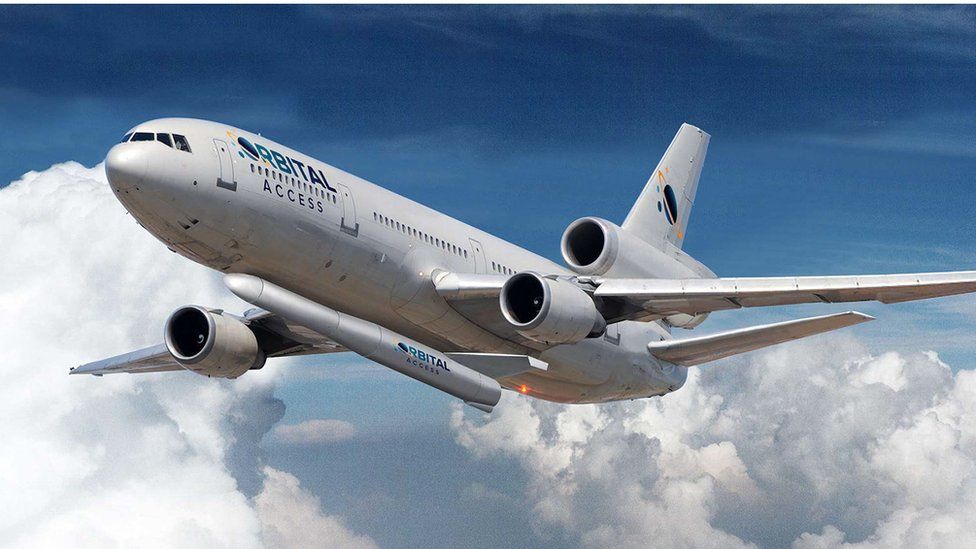Queen's Speech: Plan aims to secure space sector
- Published
- comments

A government plan to secure growth in the UK's £13.7bn space industry is laid out in the Queen's Speech.
The stated purpose of the new Bill is to make the UK the most attractive place in Europe for commercial space - including launches from British soil.
But officials and stakeholders are keen to ensure the space sector does not lose out when the UK leaves the EU.
The government intends to increase the UK share of the global space economy from 6.5% today to 10% by 2030.
Spaceports have been an important sticking point.
Previous feasibility work has already identified a number of aerodromes that might make suitable spaceports - from Cornwall to Scotland.
But as the law stands, rocket planes and other launch systems currently in development around the world would not be able to operate out of the UK. The Bill would sweep away this barrier by "enabling [scientists] to launch from UK soil".
The government says its legislation would "offer the UK's world-leading small satellite companies new options for low-cost, reliable access to space".
Overall, the legislation aims to "deliver a stronger economy by generating jobs and putting British business, engineering and science at the forefront of this technology".
It is also intended to secure continued growth of the space industry, which has been growing at an annual rate of 8% over the last decade. The sector already outperforms the UK economy as a whole.
While Brexit will not affect the UK's status as a member of the European Space Agency (Esa), projects such as Galileo - the European sat-nav system - are largely funded by the EU.
Guildford-based satellite manufacturer SSTL is building satellites for the system as part of a UK-German consortium.
But there are restrictions on "third countries" working on classified EU information and technologies, which applies to Galileo.
More on the Queen's Speech
There is now a concerted effort to keep the UK - and SSTL - inside the programme.
Likewise, the Copernicus programme - which includes an effort to gather information about the health of the Earth from satellite observations - is directed by the EU in partnership with Esa. The UK invested in the programme with the aim of ensuring access to operational data for industry and academia.
Consensus sought
Commenting on the announcement, Paul Everitt, chair of ADS, the trade association for the aerospace and defence sectors, said: "By paving the way for a UK spaceport and our own rocket and satellite launches, this commitment has the potential to generate significant further growth.
He added: "Our sectors look to the future with confidence, but this is no time for complacency. The government must put renewed energy into industrial strategy, which has delivered real results."
But Mr Everitt urged the government to refresh its approach to leaving the EU: "No deal is the worst outcome for the UK and Europe, and the government needs to build a strong consensus on the priorities and options for a successful Brexit," he said.
Neil Fraser, head of space and communications at satellite broadcasting firm ViaSat, commented: "Critics may prefer the UK Government to look closer to home, but investments in space quickly return commercial applications."
He added that space "is a dynamic, fast growing sector which employs some of the country's top talent, as well as contributing to economic growth and other important national needs, such as Earth observation and satellite communications".
One key concern for industry is getting access to qualified staff. At the moment, engineers can move without restriction inside the EU, and the UK space sector's leaders have told government that if the ambitious target for future growth is to be achieved then the recruitment of talent from the continent must continue to be frictionless.
"The UK Space Industry faces an incredibly challenging time as the country navigates its way out of the European Union," said Richard Peckham, the chairman of umbrella group UKSpace.
"For the UK industry to thrive in this new environment, it is essential that the whole sector: government, academia and industry, continue to work in partnership with a steady focus on innovation and growth, with government ready to procure and promote British products and services," he told BBC News.
Follow Paul on Twitter.